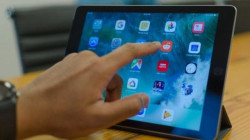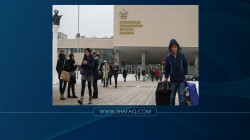2.2 million Iraqi students struggle as government scholarship payments remain delayed

Shafaq News/ Since the beginning of 2024, students have yet to receive the scholarship granted to them by the Iraqi government, burdening the parents with limited income who relied on it primarily to cover their children's educational expenses.
The law for scholarships specifies granting 30,000 dinars (23 dollars) for elementary students, 50,000 dinars (58 dollars) for middle and high school students, 100,000 dinars (76 dollars) for undergraduate students, and 150,000 dinars (114 dollars) for master and doctoral students throughout the academic year. However, so far this year, students have not received anything.
Um Hawraa, a citizen from Wasit Governorate, complained of poverty, saying, "The halt of the scholarship has had a financial impact on the student's parents," adding, "I have five children in different stages of education, and my husband is a daily wage earner, and the scholarship used to cover a significant part of the educational expenses, such as clothing, stationery, and daily expenses, so the scholarship was a lifeline for us."
Um Hawraa emphasized that "the halt of the scholarship for more than two months has affected their financial situation," urging the relevant social assistance authorities to "release salaries without delay to raise the living standards of low-income earners and alleviate the burden of educational purchases."
Material and psychological impact
Educational expert Haider Al-Mousawi explained to Shafaq News Agency that "the economic situation is one of the most important factors directly affecting the educational level. When the government decided to grant students this scholarship, it encouraged citizens to enroll their children in reinforcement courses or purchase assisting supplies and other things that support the student."
Al-Mousawi added, "The discontinuation of this scholarship has affected the psyche of the student and his family and may weaken the trust in the government, and at the same time, it will cause further fatigue considering that parents relied on this scholarship to enroll their children in reinforcement courses and purchase educational supplies, and with its halt, it will affect the student's level in one way or another."
Reasons for the delay
The head of the Social Protection Authority in the Ministry of Labor, Ahmed Khalaf Al-Mousawi, explained to Shafaq News that "the law indicates that the scholarship for students is disbursed by the Ministries of Education and Higher Education, and the Social Protection Authority has completed its procedures for calculating benefits based on official documents, and a network connection with the Ministry of Education has been established."
Al-Mousawi pointed out the disbursement of benefits for months 10, 11, and 12 to 1.85 million students. Currently, the number of students whose attendance has been approved is 2.2 million. They deserving assistance for months 1 and 2 have been handed over to the Ministry of Education.
Furthermore, he has requested disbursements from the Ministry of Finance, but this allocation has not yet been received. As for the Ministry of Higher Education, there are 20,000 eligible students, and universities have paid them for three months. They are awaiting financial allocation for the disbursement of January and February this year.
"Once the financial allocations are received, they will be reflected in the special cards for social protection beneficiaries, but the whole issue is an allocation request between the Ministry of Finance and the Ministry of Education because the issue concerns them, given that the law indicates that the grant is for students within the Ministry of Education," Al-Mousawi concluded.
Education landscape in Iraq
The education system in Iraq is tightly regulated by the government through the Iraqi Ministry of Education.
Public state education is offered free of charge, starting from Primary School and extending to Doctoral degrees. While there are private education institutes in Iraq, their high costs make them less appealing to most Iraqi citizens. However, these private institutions offer greater freedom to students, allowing them to choose their preferred study and career paths based on individual preferences, as they are not subject to government control like public schools.
In 2023, Prime Minister Mohammed Shia Al-Sudani launched the Iraq National Education Strategy 2022-2031.
The national strategy recognizes that investing in educating children and youth is Iraq's most critical development challenge.
According to the World Bank, the education strategy outlines a vision and path for a better education system and learning outcomes for all Iraqi children over the next decade. It rightly emphasizes that equitable access and learning for all Iraqi children can only be achieved by ensuring the provision of enough learning spaces and quality inputs to education.
The strategy sets ambitious goals, such as achieving universal primary and lower secondary completion by 2031, expanding enrollment in higher-secondary education, and increasing the provision of informal education services.
Additionally, the strategy aims to enhance education quality by reducing class sizes, providing continuous in-service training for teachers, expanding the teaching force to accommodate increased enrollment, and equipping schools and students with the necessary resources.
The successful implementation of this strategy will require firm financial and political commitments and support from the international community.
Furthermore, the plan calls for an increase in the share of education expenditures of the total public budget from 10% to 16% in the next decade. However, more investment may still be needed to fully address the country's human capital needs. The WB said.
Increased financial commitment, along with political dedication to investing efficiently in education infrastructure and the teaching career, prioritizing the interests of Iraqi students, will pave the way for sustainable development and improved welfare for all citizens.


